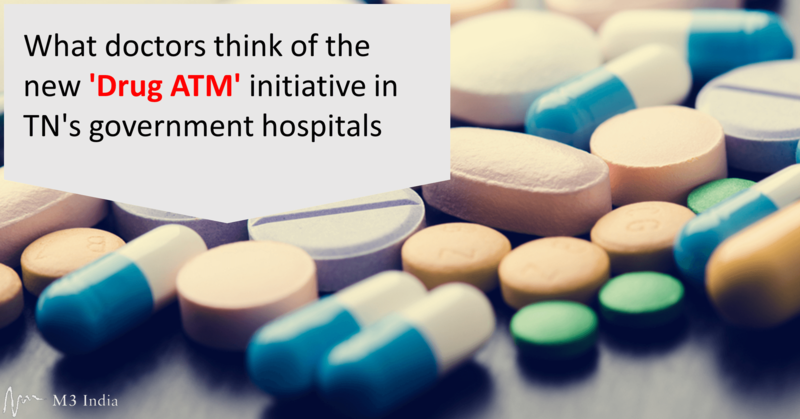What doctors think of the new 'Drug ATM' initiative in TN's government hospitals
M3 India Newsdesk Sep 17, 2019
The drug ATM apart from dispensing medicines, can prove beneficial for tracking drug distribution, medication adherence, and collecting valuable epidemiological data. Doctors in TN however, think that the initiative may bring about a new set of challenges to tackle in smaller towns and districts.

The Chief Minister of Tamil Nadu had announced in a parliamentary session in June this year, the installation of automated drug vending machines in 32 locations across the states, including in all the 23 medical college hospitals, five health centres in Chennai and the rest is other district hospitals. This ‘ATM’ will service patients 24/7 and the government of TN has allocated a budget of Rs. 80 lakhs for this project. The drug vending machine would allow patients to 'withdraw' medicines for ailments like leprosy, diabetes and 28 other kinds of diseases by simply scanning the QR code in their medical prescription.
In theory, this can solve a host of problems like the shortage of pharmacists and limited working hours of government pharmacies, long waiting time to get prescriptions refilled and pilferage in free drugs programs. Speaking to M3India, Secretary of Health for the state, Dr. Beela Rajesh said, “The government has proposed this bill to ensure patients get easy access to medicines. All Government hospitals function for 24 hours but the fact that pharmacists are unavailable for prolonged durations creates an inconvenience to the patients. The government looked upon automatic drug vending machines to battle this problem.”
On the quality side, this will allow medicines to be stored and dispensed near the point of care while controlling and tracking drug distribution. The biggest advantage is the ability to keep track of patients with chronic ailments and ensure they follow treatment and medications, especially in cases like TB where uninterrupted treatment is necessary. The data recorded through these machines could also help in obtaining valuable epidemiological data.
But previous attempts to implement this program, with different operational parameters, have not met with success. In 2015, five such machines were supposed to have been introduced in rural Betul in Madhya Pradesh, combining telemedicine with a rudimentary free drugs program. In 2016, five healthcare ATMs were to come up in the states of MP, Himachal Pradesh, Odisha and Andhra Pradesh. In the same year, an automatic medicine vending machine was installed at an Aam Aadmi Mohalla clinic in Delhi and nine others were to follow after a cost-benefit analysis.
In Tamil Nadu itself, the government had attempted to roll out these ATM last year but it didn’t materialise. Currently, the state has the largest treatment program in the country, with lakhs of residents receiving drugs for diabetes and blood pressure, purchased by the Tamil Nadu Medical Service Corporation and given free to patients treated in government hospitals. It’s the perfect laboratory to launch this experiment. But it appears the state government is once again dragging its feet over this.
Dr. Rajesh said, “The Chief Minister had announced the plan in the parliament session but as of now there is no official confirmation, only after which the project can be enforced. The tender for the manufacturing of these machines will be conducted only post-notification. Until the tender is taken up by a company, we do not know the detailed working mechanism of the machine." She also added that patients would be issued prescriptions with QR codes with which the drugs could be obtained. Doctors would be given formal training on the functioning of these machines concerning the QR codes before enforcement.
Medical practitioners in the state are of the opinion that the state government must look at both the advantages and disadvantages of this project before implementing it. General Secretary of the Doctors Association for Social Equality, Dr Ravindranath said, "There are a lot of hurdles enforcing this project in the state. Apart from Chennai, most patients who visit government hospitals in other districts are not literate therefore the concept of drug vending machines would only make their lives harder. To overcome this issue, the state must also ensure that it stations a person at these machines across all centres in the state. But they should rather employ more pharmacists."
The human element is crucial for patient care, according to him. "Pharmacists guide patients about when and how the medicines are to be consumed, unlike the machines that simply vend the drugs.” He is also concerned about the loss of jobs for pharmacists. “If the government is keen on providing a 24-hour facility to patients then it might as well just increase the number of shifts of pharmacists in government hospitals, this will keep the pharmacy opened for 24-hours," he said.
The author, Mydeen Abdul Kathar is a Chennai - based freelance writer and a member of 101Reporters.com, a pan-India network of grassroots reporters.
-
Exclusive Write-ups & Webinars by KOLs
-
Daily Quiz by specialty
-
Paid Market Research Surveys
-
Case discussions, News & Journals' summaries